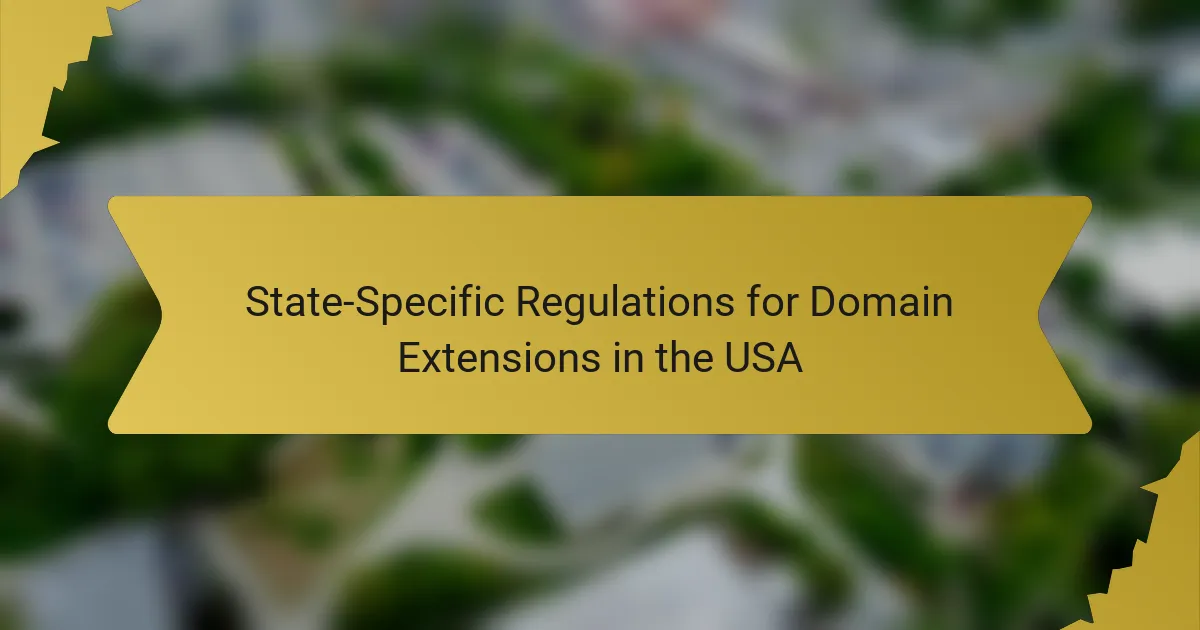State-specific regulations for domain extensions in the USA, such as .com, .org, and .net, can significantly influence registration processes and usage. Each state has unique requirements that affect businesses and individuals aiming to establish their online presence. Familiarity with these regulations is essential for compliance and effective operation within the digital landscape.
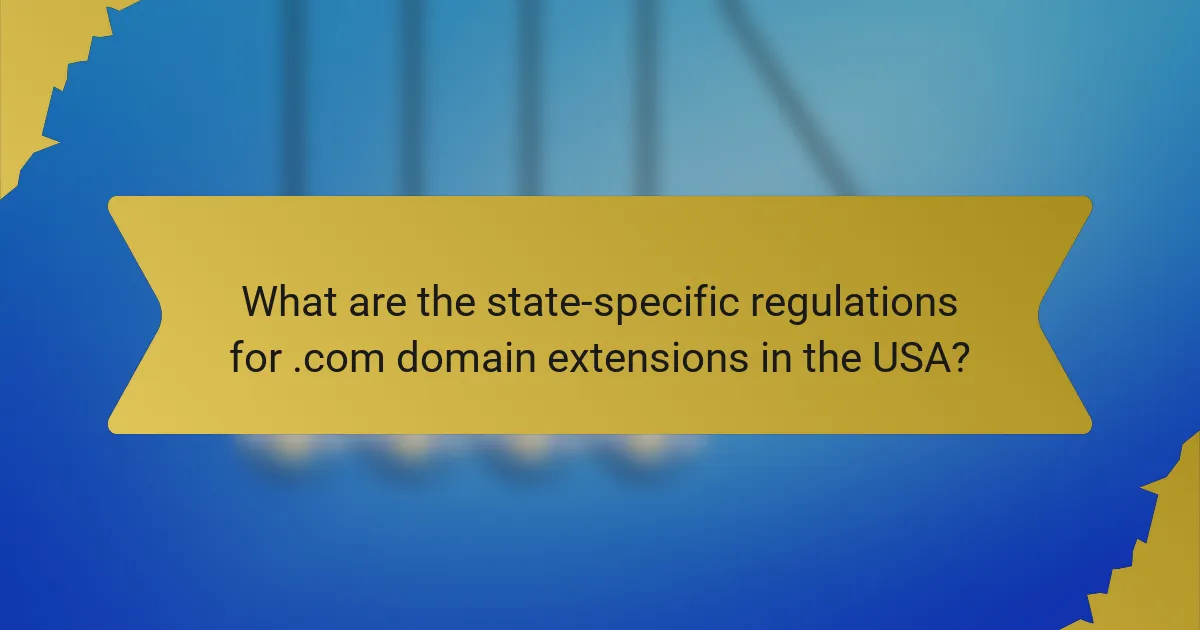
What are the state-specific regulations for .com domain extensions in the USA?
State-specific regulations for .com domain extensions in the USA vary by state, focusing on registration requirements, business practices, and consumer protection. Understanding these regulations is crucial for businesses and individuals looking to establish an online presence.
California regulations
In California, businesses must comply with the California Consumer Privacy Act (CCPA) when operating a website with a .com domain. This law requires clear disclosures about data collection and usage, along with the option for consumers to opt-out of data selling.
Additionally, California has specific regulations regarding online advertising and marketing, which can impact how businesses promote their .com domains. Companies should ensure compliance to avoid penalties and maintain consumer trust.
Texas regulations
Texas does not have extensive regulations specifically targeting .com domain extensions, but businesses must adhere to general advertising laws and consumer protection statutes. This includes truth in advertising and avoiding deceptive practices.
Texas also emphasizes the importance of domain name registration accuracy. Businesses should ensure that their registration information is up-to-date to avoid potential legal issues or disputes over domain ownership.
New York regulations
New York has stringent regulations regarding online commerce, particularly under the New York General Business Law. Businesses using a .com domain must ensure compliance with these laws, which include clear pricing, return policies, and consumer rights.
Furthermore, New York’s regulations on data security require businesses to implement reasonable safeguards for consumer data, which is essential for maintaining a trustworthy online presence.
Florida regulations
Florida’s regulations for .com domains focus on consumer protection and online business practices. The Florida Deceptive and Unfair Trade Practices Act prohibits misleading advertising and requires transparency in business operations.
Additionally, businesses must comply with the Florida Digital Bill of Rights, which includes provisions for data privacy and consumer rights, making it essential for .com domain owners to stay informed about these regulations.
Illinois regulations
In Illinois, businesses operating a .com domain must comply with the Illinois Consumer Fraud and Deceptive Business Practices Act. This law mandates honest advertising and prohibits misleading claims about products or services.
Moreover, Illinois has specific requirements regarding the handling of consumer data, including the Illinois Personal Information Protection Act, which necessitates secure data practices for businesses to protect consumer information effectively.
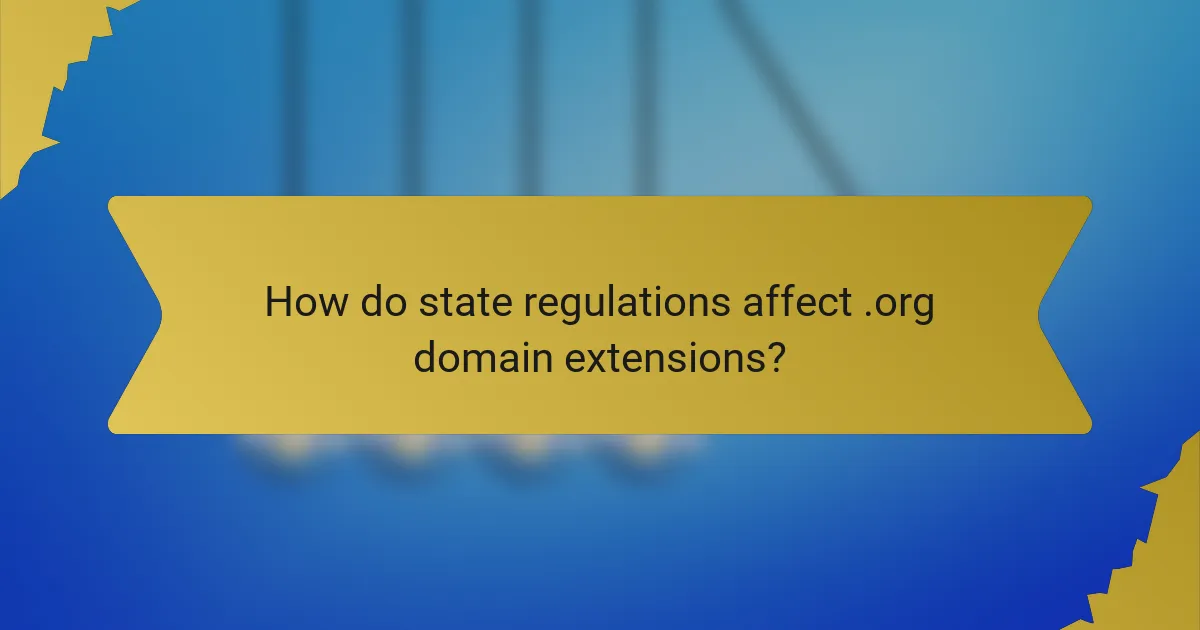
How do state regulations affect .org domain extensions?
State regulations can significantly impact the registration and use of .org domain extensions, especially for organizations operating within specific jurisdictions. Each state may have unique requirements or guidelines that influence how these domains are utilized, particularly for non-profit entities.
California .org requirements
In California, organizations seeking to register a .org domain must ensure they are compliant with state laws governing non-profits. This includes being registered with the California Secretary of State and obtaining a federal Employer Identification Number (EIN). Additionally, organizations must adhere to the California Nonprofit Corporation Law, which outlines operational guidelines.
It’s advisable for California-based entities to maintain transparency in their operations and financial reporting, as this can affect their credibility and eligibility for certain funding opportunities. Non-profits should also consider local tax exemptions that may apply to their activities.
Texas .org requirements
Texas has specific regulations for .org domains that cater to non-profit organizations. To register a .org domain, entities must first file for incorporation as a non-profit with the Texas Secretary of State and obtain an EIN. Compliance with Texas Business Organizations Code is essential for maintaining good standing.
Organizations in Texas should be aware of the state’s requirements for annual reporting and financial disclosures. This ensures that they remain compliant and can access various funding sources, including state grants and donations. It’s beneficial to consult with a legal expert familiar with Texas non-profit regulations to navigate these requirements effectively.
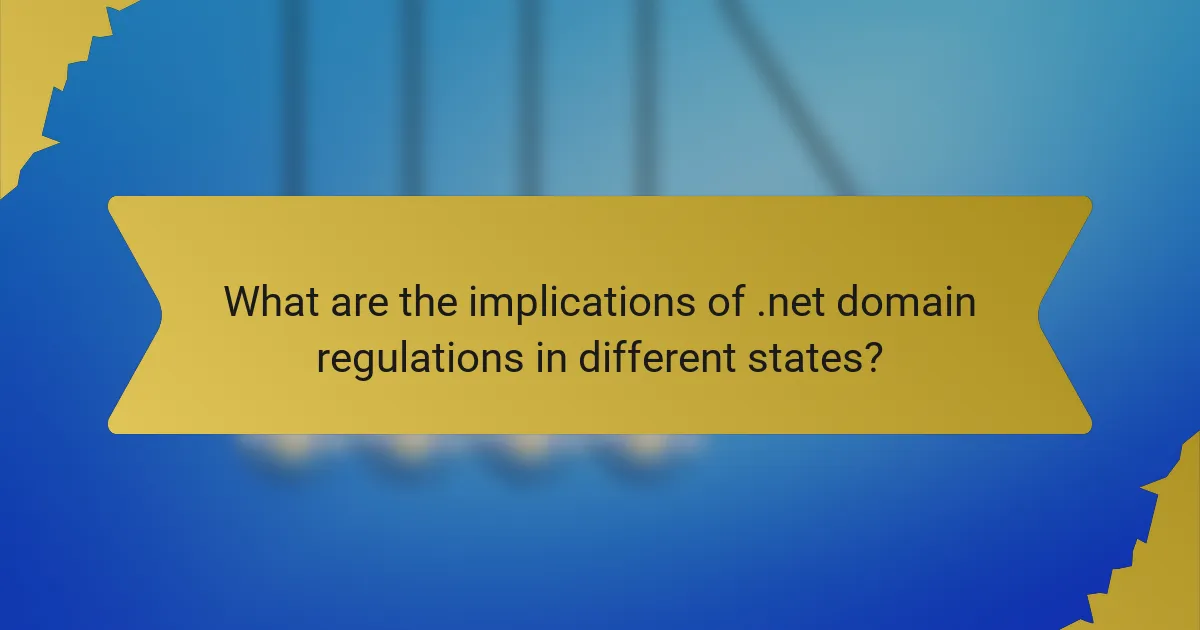
What are the implications of .net domain regulations in different states?
The implications of .net domain regulations vary by state, affecting how businesses and individuals can register and use these domains. Understanding these state-specific guidelines is crucial for compliance and effective online presence.
California .net guidelines
In California, .net domains are subject to the same federal regulations as other domain extensions, but local businesses must comply with state-specific business registration laws. This includes ensuring that the domain name does not infringe on existing trademarks registered in the state.
Additionally, California has stringent privacy laws, such as the California Consumer Privacy Act (CCPA), which may impact how personal information associated with .net domain registrations is handled. Businesses should consider implementing privacy protection services when registering their domains.
Texas .net guidelines
Texas regulations for .net domains emphasize the importance of adhering to state business laws, including proper registration and compliance with the Texas Business Organizations Code. This ensures that domain names reflect the legal entity’s name as registered with the state.
Moreover, Texas does not have specific laws governing domain privacy, but it is advisable for businesses to consider privacy protection to safeguard their information. This can help prevent unauthorized access and potential misuse of domain registration details.
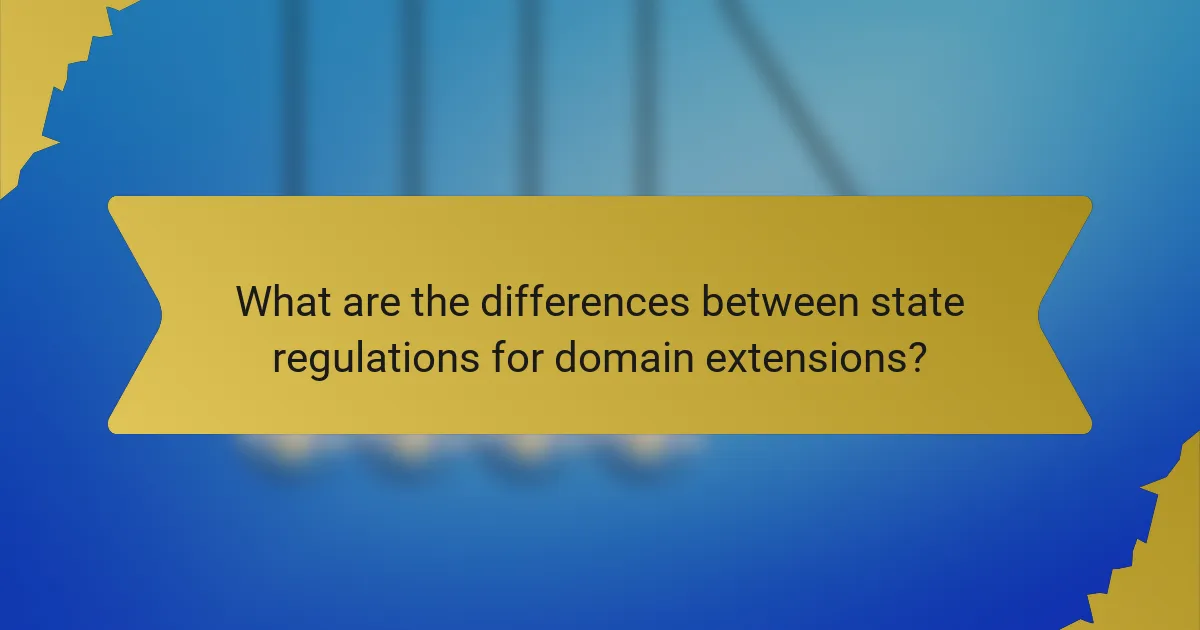
What are the differences between state regulations for domain extensions?
State regulations for domain extensions in the USA vary significantly, affecting how businesses can register and use these domains. Each state may impose unique rules regarding eligibility, registration processes, and compliance requirements.
Comparison of regulations
Different states have distinct regulations governing domain extensions. For example, some states require businesses to provide proof of local presence or compliance with state laws, while others may have more lenient requirements. Additionally, certain states may restrict specific domain extensions to particular industries, such as healthcare or finance.
To illustrate, California may have regulations that emphasize consumer protection and transparency, while Texas might focus on business-friendly policies that encourage rapid registration. It’s essential for businesses to research and understand the specific regulations applicable in their state to ensure compliance.
Impact on businesses
The differences in state regulations can significantly impact how businesses operate online. Companies that fail to comply with local domain registration rules may face penalties, including fines or the loss of their domain. This can disrupt online presence and brand reputation.
Moreover, understanding these regulations can provide a competitive advantage. Businesses that align their domain strategies with state requirements can enhance their credibility and trustworthiness among local consumers. It’s advisable to consult with legal experts or domain registration services familiar with state-specific regulations to navigate these complexities effectively.
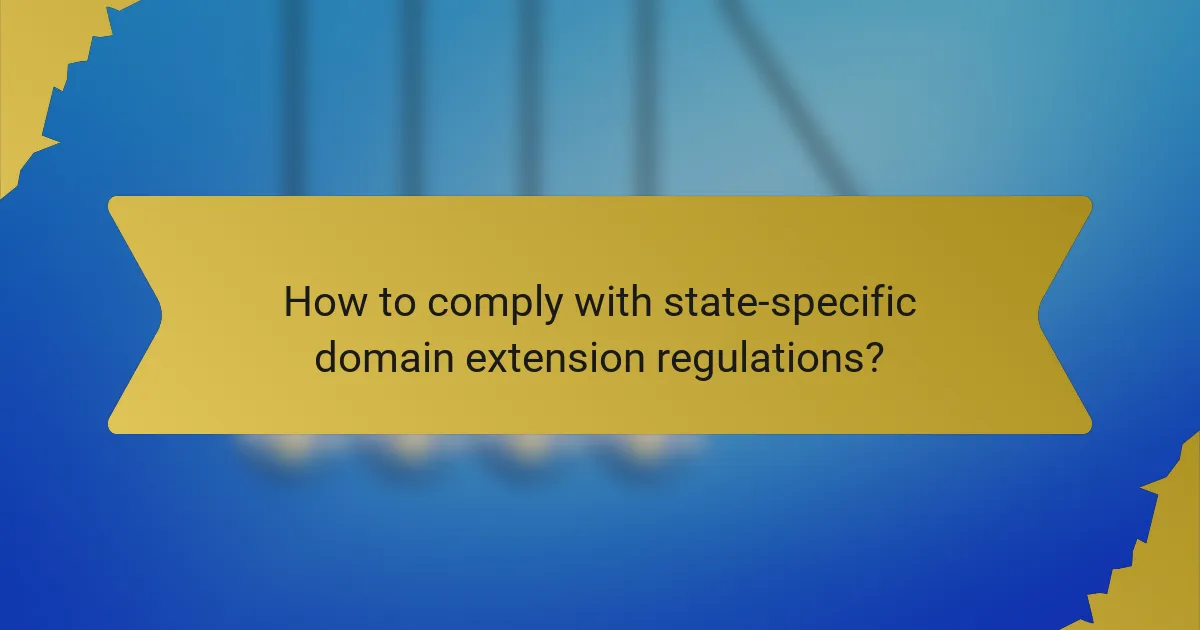
How to comply with state-specific domain extension regulations?
To comply with state-specific domain extension regulations in the USA, businesses must understand the unique requirements of each state regarding domain registration and usage. This involves researching local laws and ensuring that domain names align with state regulations to avoid penalties.
Steps for compliance
Start by identifying the specific regulations for domain extensions in your state. Each state may have different rules regarding the use of certain extensions, such as .gov, .edu, or .org, especially for government and educational institutions. Review the guidelines provided by state authorities or domain registrars.
Next, register your domain through an accredited registrar that complies with both federal and state laws. Ensure that your chosen domain name does not infringe on trademarks or existing business names within your state. Regularly check for updates to regulations, as these can change over time.
Resources for businesses
Utilize resources such as the National Association of Secretaries of State (NASS) and state-specific business websites to find information on domain regulations. These platforms often provide guidelines and links to relevant legal resources.
Consider consulting with a legal expert specializing in internet law to navigate complex regulations. Additionally, domain registrars often have support teams that can assist with compliance issues and provide insights into best practices for your specific state.
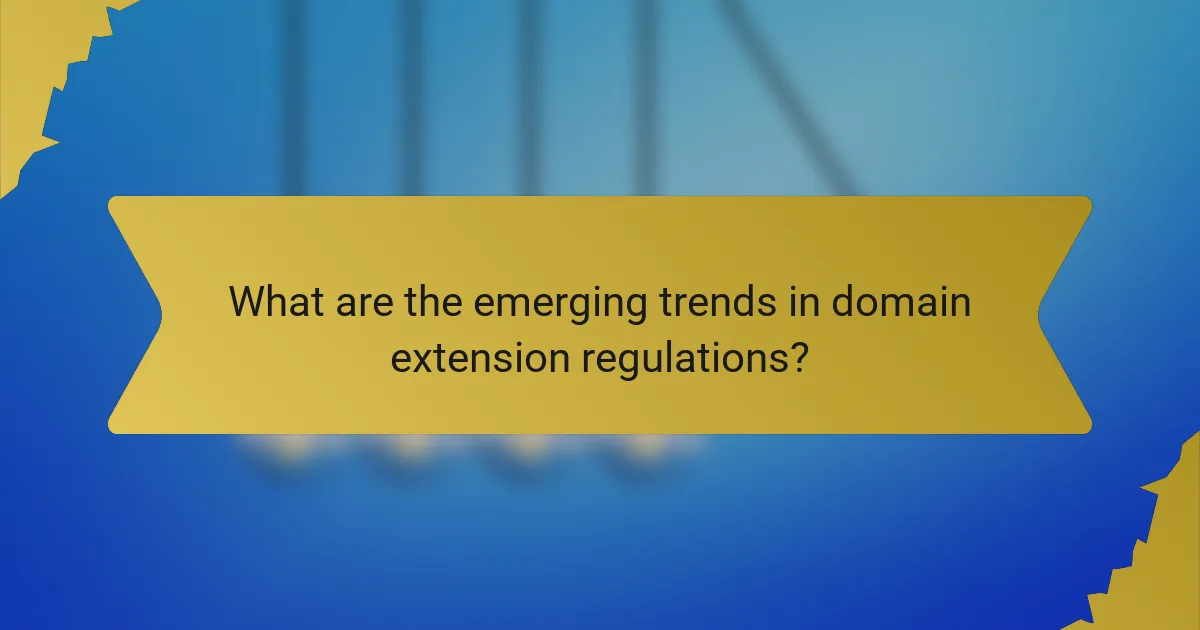
What are the emerging trends in domain extension regulations?
Emerging trends in domain extension regulations in the USA include increased scrutiny of domain registration practices and the introduction of new top-level domains (TLDs) that cater to specific industries. These changes aim to enhance security, improve user experience, and ensure compliance with evolving digital policies.
Impact of new legislation
New legislation is reshaping how domain extensions are regulated, focusing on consumer protection and cybersecurity. For instance, laws may require registrars to verify the identity of domain owners more rigorously, which can help prevent fraud and abuse.
Additionally, state-specific regulations may emerge, impacting how businesses operate online. Companies must stay informed about local laws to avoid penalties and ensure compliance when registering new domain extensions.
Future of domain extensions in the USA
The future of domain extensions in the USA is likely to see a diversification of TLDs, catering to niche markets and industries. This trend will allow businesses to choose domain names that better reflect their brand identity and target audience.
As regulations evolve, businesses should prepare for potential changes in registration processes and compliance requirements. Staying proactive in understanding these trends will be crucial for maintaining a competitive edge in the digital landscape.
